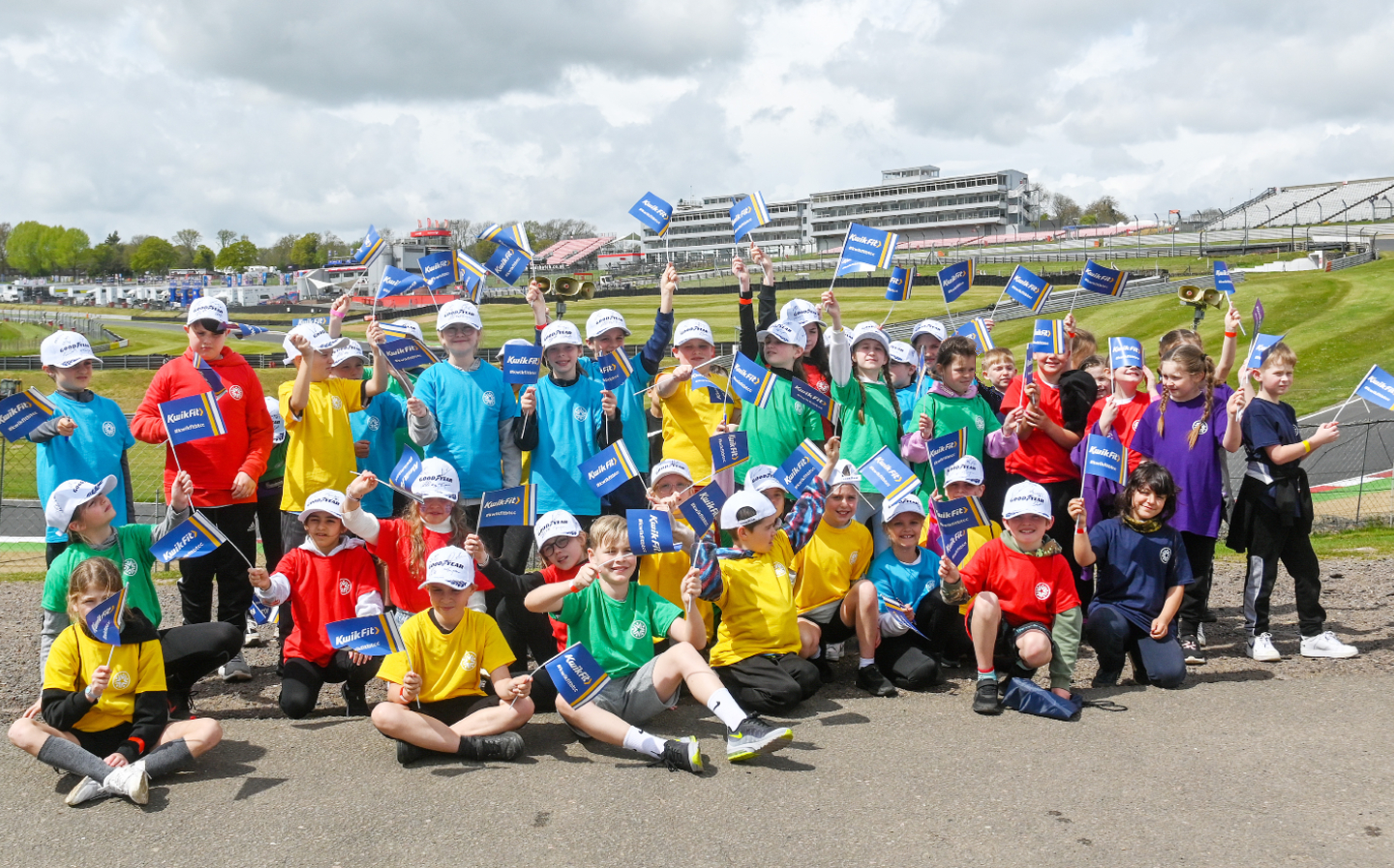Kids in Motorsport: How the BTCC is helping get children’s careers on the right track
As the British Touring Car Championship enters its final weekend of 2023, Driving.co.uk reports on the initiative designed to inspire a new generation of motor racing professionals
Ask a group of schoolchildren what motorsport involves and most would say driving racing cars. A few might mention the pit crews and engineers. But in fact there are dozens of possible roles, from team boss to marketing manager, tyre specialist to race doctor — careers that many young people might never have considered.
Opening their eyes to the many job opportunities available is Kids in Motorsport, an initiative developed with the British Touring Car Championship (BTCC) and car servicing company Kwik Fit that engages with primary schools to give children a flavour of the many types of jobs available in the industry, and to show how they are suited to different personalities, from the demure and academic to the confident and outgoing.
Louise Goodman, who co-presents the BTCC television coverage on ITV4 and is one of the professionals the children may meet during the events, is well used to those attending being surprised at the variety of careers related to racing.
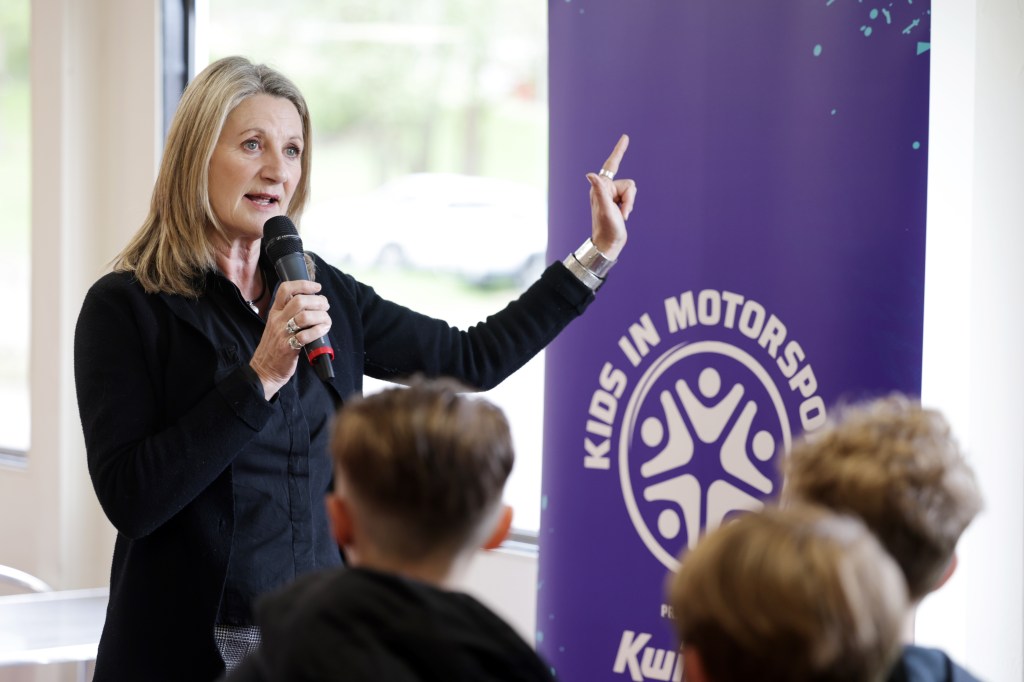
“One kid earlier today said, ‘Oh, my god, there’s an ambulance here,’” she tells me during a Kids in Motorsport session at Brands Hatch circuit in Kent. “Well, yeah, I said, because there are doctors and nurses who work in motorsport. And there are also people who are massively into cooking who work in motorsport, doing the catering. They’re journalists, too – people who like writing.”
They’re not necessarily the same thing, I venture, but I get her point.
Kids in Motorsport may have been inspired by a separate scheme, run by the FIA (motorsport’s global governing body) that aims to encourage more women into male-dominated motor racing. The BTCC organisers wanted to run an event, though, that was focused on primary school children of both sexes. It incorporates elements focused on core STEM (Science, Technology, Engineering and Maths) subjects, and so uncovers related topics in which children might be interested but didn’t realise were part of racing.
“Engineering doesn’t just mean the physical mechanics of it,” Goodman says. “We’ve got a lot of data engineers [working for the teams], for example, so one challenge the children will be doing here today is some coding.”
Set out on tables around the room are trays of Lego Technic parts. Children are sorted into pairs and then tasked with following instructions to build motorised model cars and then control their movement with tablets.




“Motorsport by its definition is competitive, so it wants to try to find the best people,” Goodman says, “but some people are suited to coding and engineering but others might excel in other areas. It’s really important that everybody gets a view of the different roles that there are available to them in motorsport, and it’s like, ‘Come and see what we do, because it might not be what you think we do.”
Roles are refreshingly non-gendered at this age — boys and girls alike got stuck into the Lego, while Goodman’s masterclass in TV presenting split the kids on grounds of self-belief rather than chromosomal composition. But, of course, regardless of their confidence levels, Goodman is a natural at putting the children at ease, and she finds a way to keep even the most timid engaged.
Her TV presenter workshops start with a short intro on what she does during a race weekend before round-table discussions on subjects such as what makes a good question for the drivers (“Don’t ask something that could be answered with a single word,” for example). Then the kids are picked to role-play the post-race interviews: three drivers and a presenter.




While some leap at the opportunity and are desperate to grab the microphone, of course others aren’t at all keen — the shrinking violets were all-too apparent on the day we attended.
“You’ll have one group who are all massively up for something and then you’ll have another group who don’t want to engage,” says Goodman. “Sometimes you’ll get kids who are painfully shy, and others who clearly have a place on the stage and love the limelight.
“At the end of the day, they all need to have fun. Yes, it’s great if they learn some stuff, as well, but, you know, it’s not a test. It’s supposed to be an enjoyable day out for them.”



Even a section of the day dedicated to UN sustainable development goals was presented as playfully as possible — children were asked to link up cards showing global environmental issues with simple actions that can help reach sustainability goals. It went down better than you’d imagine, though it’s fair to say it wasn’t on the list of activities most children recalled at the end of the event.
Normally children also get to meet Clare Morden, intensive care medicine consultant and BTCC race doctor, and take part in reaction and resuscitation challenges. However Morden — a practising critical care medic — had to pull out at the 11th hour due to being put on call. It was a clear insight into her busy schedule, at least.
Arguably the most fun comes away from the classroom, though; the tour of the paddock and pit garages is a highlight of the event. So as not to take up all of a single team’s time, different groups meet different teams – some might be shown around Toyota Gazoo Racing’s garage, another might venture into that of Bristol Street Motors ExcelR8 Motorsport to see how they prep their Hyundai i30 N racers.




And while a team boss or marketing chief might lead the groups, drivers and engineers are also on hand to show the children around and answer questions, too. Many of the stars of BTCC came to say hello and talk to the groups during the day, including Tom Ingram, Rory Butcher, Jake Hill, Jade Edwards and Nicholas Hamilton (Lewis’s brother), which delighted me as much as the schoolkids.
And the questions are superb. “Is your car as fast as a McLaren?” is one; “Is it comfortable inside?” is another (so comfortable, due to the moulded seats, that Ingram has fallen asleep in his car while waiting around on a test day, apparently); “What happens if you need to go to the toilet?” is a third. And, of course, “How much does the car cost?”
Eat your heart out, Goodman.




This is almost unbelievable access to professional racing teams these days — you’d never get this up close and personal with an F1 outfit. The children are even allowed to sit in the cars.
More than one team member told us that Kids in Motorsport is very much worth the effort; if it sparks a lifelong passion in just one child, or inspires someone to go onto a career in racing, then it’s job done.
As Kwik Fit is one of the driving forces (pun intended) behind Kids in Motorsport, it’s no surprise that we spend quite some time with the folks at Goodyear — the BTCC’s exclusive tyre supplier.


Gathered around Goodyear’s transporter (truck driving – that’s another potential career, it is pointed out), the children are addressed by Mickey Butler, Goodyear Dunlop’s UK manager, and Amy Flood, senior premium brand manager, about the science behind racing tyres and the sheer magnitude of the logistical operation in getting all four compounds ready for the teams. They’re a dream team and make what could be a dry topic fascinating. Meanwhile, behind us a team of workers hurriedly fit new tyres to wheel rims, then fill them with air, in a pop-up assembly line.
The icing on the kids’ cake is being given goodie bags by each of the teams, and the Goodyear baseball caps that are handed out are signed by pretty much everyone the children encounter on the way back to the coaches, from star drivers to photographers. The children might not know who most of these people are (most are far from famous) but regardless, it’s all tremendously exciting, and much of it makes an impression.





“I noticed there were lots of females,” nine-year-old Tate, tells me afterwards. “The bit I liked was making the little cars.” Making things for a living would be pretty cool, she reckons.
Eva, also nine, adds that the handouts were great (“You get flags!”), but she particularly enjoyed the TV presenting part of Kids in Motorsport. “The TV woman was great,” Eva says. “She said that she gets nervous, so if she is nervous on TV then I would probably get really nervous. But maybe it’s fun being scared sometimes; it can boost you onwards, I guess.”
Q&A: Louise Goodman on female representation in motorsport
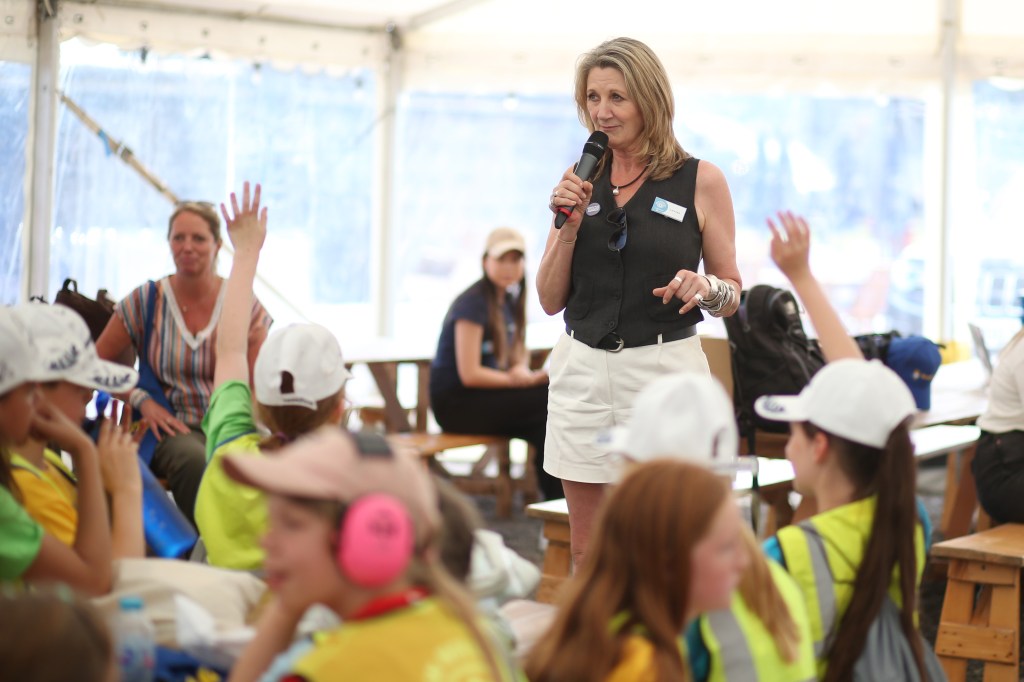
How important is it to get girls along to Kids in Motorsport?
I think there are still external perceptions and I found it a lot from working at these events. People have very fixed ideas still about motorsport. They think it’s very masculine, they think it’s a boy thing and they don’t actually realise how much there is to it; they think it’s all about cars, which I guess it is to a large extent. But I’ve just had a group of all boys and that’s the first group I’ve had that none of them know anything about motor racing. So from that perspective, it’s encouraging to me to see that there are girls who’ve been in my earlier groups who do know lots about motor racing, and watch it.
How do you think we change perceptions?
This is something I’ve done a real about-turn on from a personal perspective, because back in the day when I was first working in motorsport, there were so few women. I mean the sport, generally speaking, was a lot smaller. When I joined Jordan Grand Prix as their press officer I was employee number 47, you know, and that was everybody — the entire factory. Whereas now you have 47 people just in certain departments.
So the sport has grown in terms of the numbers working within it. But when I was first working in the sport, I was very much, like, ‘So what I’m a woman? Don’t point it out. I’m just here to do a job; don’t make a thing of it.’
When I started working for TV and obviously had a bit more visibility, it amazed me how many young girls came up and said, ‘Oh my god, I didn’t know ’til I saw you doing the stuff on the television that girls worked in motorsport. I didn’t realise.’ And it made me think, well, actually that visibility really is important.
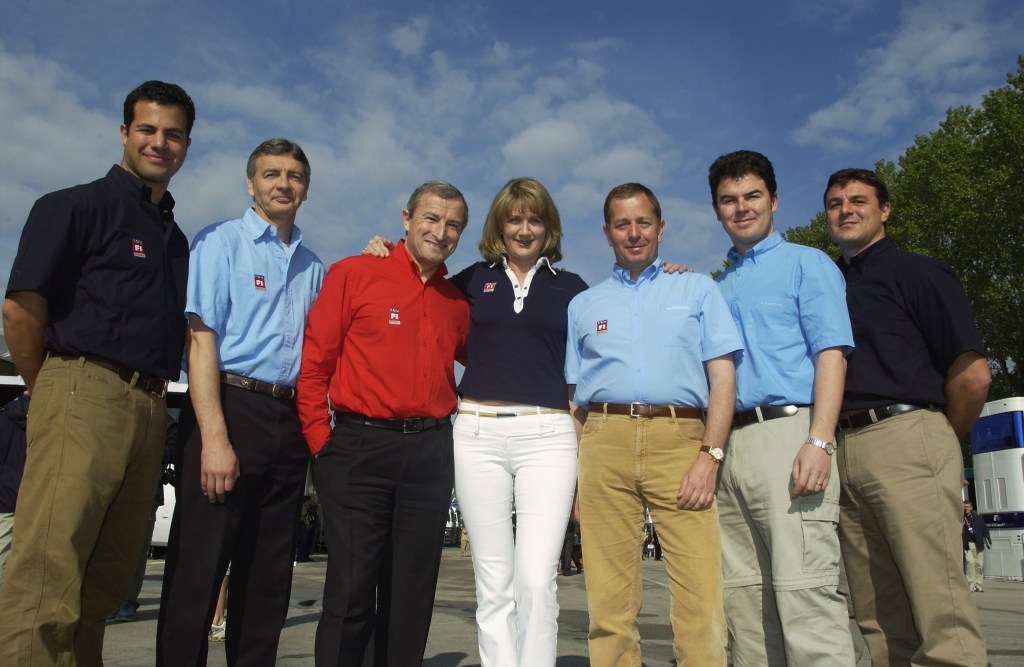
It was one thing that Susie Wolff (former professional racing driver and current managing director of F1 Academy) used to say, you know, in the beginning of Dare to be Different (the FIA programme to encourage women into motorsport), ‘You need to see it to be it.’ And I think it’s quite true. We need role models.
Female role models other than those standing in front of cars with a board?
Yes. Yes. Which is not the role model I want to see portrayed as a woman’s place in motorsport. And that’s what today (Kids in Motorsport) is all about. There are so many places in motorsport, be it for male or female.
So yes, I’m passionate about getting more women involved and visibility is important because any young person will look up to role models, be they male, female, whatever. My experience of young girls coming in saying, ‘Oh my god, I didn’t realise. And then I saw that you there doing it,’ that’s really when I became a bit more comfortable with being a bit more upfront about it.
And I know it leads to accusations. You’ll see accusations now of, ‘Oh, it’s all biased towards women. It’s all women getting opportunities.’ I think, well, you say that but come and sit up in the media centre and see how many women are there, and you’ll find it’s not that many. So I’m quite happy to stand up and be counted for for trying to get more of them there, and I don’t care if you are accusing me of bias, because quite frankly, I’m just trying to shift what is an existing bias, albeit maybe from a position of a lack of knowledge.
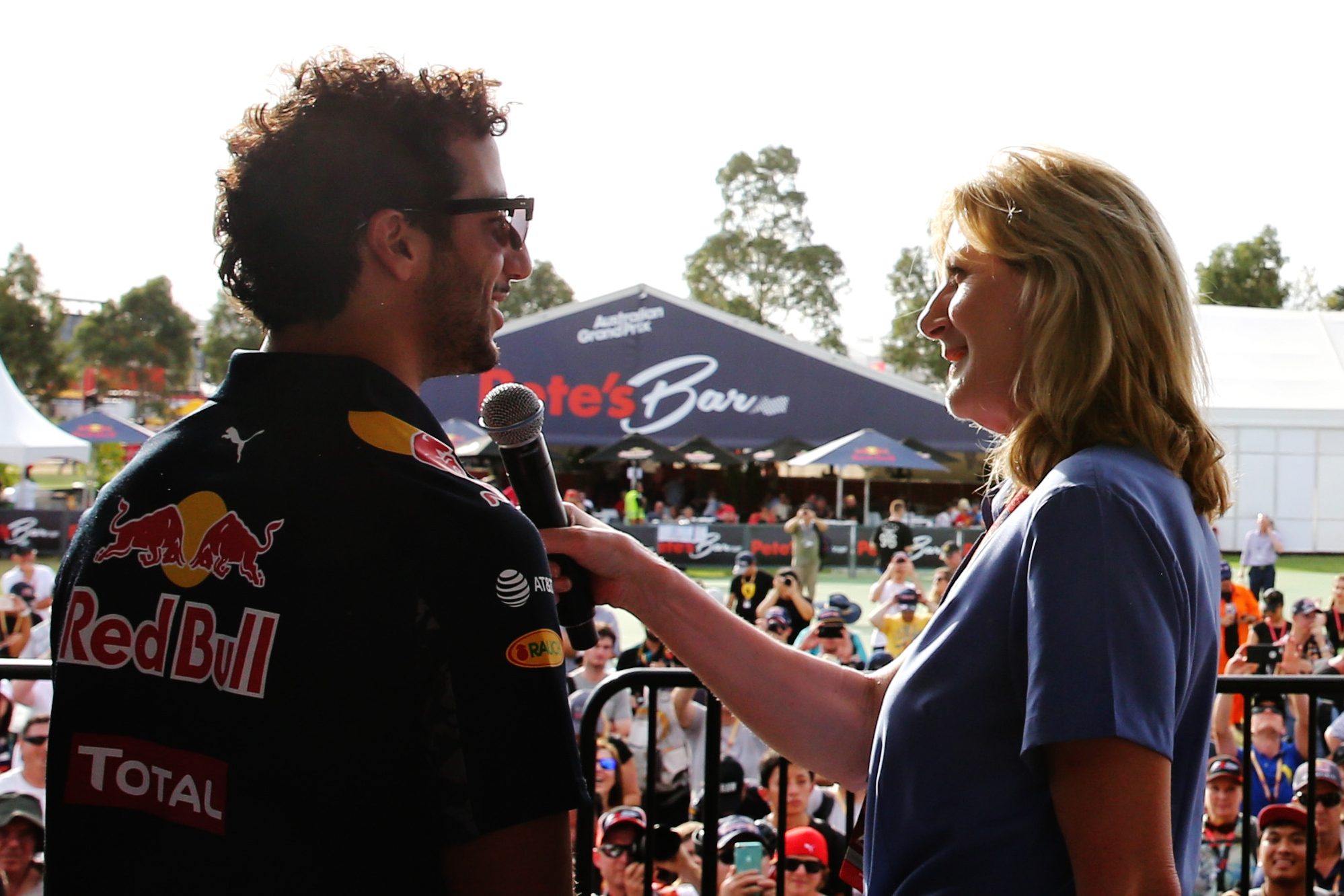
How important is education in addressing the issues?
I think a lot of it stems from the education sector that we’re in. Interestingly, I did an online interview in lockdown — I think it was for FIA Girls on Track, which Dare to be Different has become — with a bunch of female engineers, and out of the six of them, five had been to all-girls schools. Which I thought was really interesting. That to me would suggest that within the education system there is still a bias pushing boys towards the STEM subjects. I could be wrong. As I say, it’s a pretty small sample, but it’s like, well, it seems a bit unusual that.
You think all-girls’ schools might be addressing the issue better than mixed schools?
In a girls’ school that’s maybe been addressed because they’ve got to find the girls who are the engineers of the future. So I think there is still that bias within society, generally speaking. I don’t know enough about the education system but just on that very small personal example of it, you think, well, hang on a minute, why? You know?
So do you think about male bias and inspiring young women when you’re standing in front of the camera?
No, no, no. Never crosses my mind. I’m just there doing my job when I’m standing in front of the camera. That’s when I go back to the, ‘I don’t give a monkey’s what sex anybody is, I’m just here to do a job and do it to the best of my ability.’ So no, I don’t think about it at all.
Where did your interest in motorsport come from?
I had no family background in motorsport. I was instinctively interested in anything with wheels and an engine. I think they’re always going to be people like me who just came out the womb that way.
The BTCC 2023 season finale will be shown live on ITV4 from 10.45am this Sunday, October 8.
Images: Jakob Ebrey Photography
Related articles
- If you were interested in this story about the Kwik Fit/ BTCC Kids in Motorsport programme, check out the time we got a chance to be Colin Turkington for a day at the BMW M driving experience
- ‘Old school’ games rule when it comes to keeping kids entertained in the car
- Duke of Richmond Q&A: 75 years of Goodwood motorsport, sustainability and why grandad would think I am bonkers
Latest articles
- Omoda 5 prototype review: Bargain family SUV is solid first effort for new Chinese brand
- Dacia Duster 2024 review: Rugged, affordable SUV modernised with electrification and quite the glow up
- Audi A3 Sportback 2024 review: Softly, softly, catchy premium hatchback buyer
- New electric-only Mini Aceman fills gap between Mini Cooper hatch and Countryman SUV
- Tesla driver arrested on homicide charges after killing motorcyclist while using Autopilot
- Porsche Macan 2024 review: Sporty compact SUV goes electric, but is it still the class leader for handling?
- F1 2024 calendar and race reports: What time the next grand prix starts and what happened in the previous rounds
- Aston Martin DBX SUV gets the interior — and touchscreen — it always deserved
- Nissan unveils bold look for updated Qashqai, still made in UK


